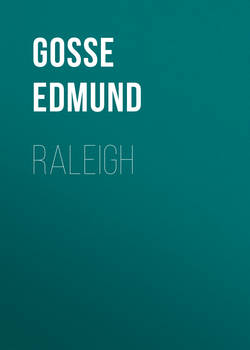Raleigh

Реклама. ООО «ЛитРес», ИНН: 7719571260.
Оглавление
Gosse Edmund. Raleigh
PREFACE
CHAPTER I. YOUTH
CHAPTER II. AT COURT
CHAPTER III. IN DISGRACE
CHAPTER IV. GUIANA
CHAPTER V. CADIZ
CHAPTER VI. LAST DAYS OF ELIZABETH
CHAPTER VII. THE TRIAL AT WINCHESTER
CHAPTER VIII. IN THE TOWER
CHAPTER IX. THE SECOND VOYAGE TO GUIANA
CHAPTER X. THE END
Отрывок из книги
Walter Raleigh was born, so Camden and an anonymous astrologer combine to assure us, in 1552. The place was Hayes Barton, a farmstead in the parish of East Budleigh, in Devonshire, then belonging to his father; it passed out of the family, and in 1584 Sir Walter attempted to buy it back. 'For the natural disposition I have to the place, being born in that house, I had rather seat myself there than anywhere else,' he wrote to a Mr. Richard Duke, the then possessor, who refused to sell it. Genealogists, from himself downwards, have found a rich treasure in Raleigh's family tree, which winds its branches into those of some of the best Devonshire houses, the Gilberts, the Carews, the Champernownes. His father, the elder Walter Raleigh, in his third marriage became the second husband of Katherine Gilbert, daughter of Sir Philip Champernoun of Modbury. By Otto Gilbert, her first husband, she had been the mother of two boys destined to be bold navigators and colonists, Humphrey and Adrian Gilbert. It, is certainly the influence of his half-brother Sir Humphrey Gilbert, of Compton, which is most strongly marked upon the character of young Raleigh; while Adrian was one of his own earliest converts to Virginian enterprise.
The earliest notice of Sir Walter Raleigh known to exist was found and communicated to the Transactions of the Devonshire Association by Dr. Brushfield in 1883. It is in a deed preserved in Sidmouth Church, by which tithes of fish are leased by the manor of Sidmouth to 'Walter Rawlegh the elder, Carow Ralegh, and Walter Ralegh the younger,' on September 10, 1560. In 1578 the same persons passed over their interest in the fish-titles in another deed, which contains their signatures. It is amusing to find that the family had not decided how to spell its name. The father writes 'Ralegh,' his elder son Carew writes 'Caro Rawlyh,' while the subject of this memoir, in this his earliest known signature, calls himself 'Rauleygh.'
.....
In August, Raleigh's temporary governorship of Munster ended. He was too young and too little known a man permanently to hold such a post. Zouch took his place at Lismore, and Raleigh, returning to Cork, was made Governor of that city. It was at this time, or possibly a little earlier in the year, that Raleigh made his romantic attack upon Castle Bally-in-Harsh, the seat of Lord Roche. On the very same evening that Raleigh received a hint from head-quarters that the capture of this strongly fortified place was desirable, he set out with ninety men on the adventure. His troop arrived at Harsh very early in the morning, but not so early but that the townspeople, to the number of five hundred, had collected to oppose his little force. He soon put them to flight, and then, by a nimble trick, contrived to enter the castle itself, to seize Lord and Lady Roche at their breakfast-table, to slip out with them and through the town unmolested, and to regain Cork next day with the loss of only a single man. The whole affair was a piece of military sleight of hand, brilliantly designed, incomparably well carried out. The summer and autumn were passed in scouring the woods and ravines of Munster from Tipperary to Kilkenny. Miserable work he found it, and glad he must have been when a summons from London put an end to his military service in Ireland. In two years he had won a great reputation. Elizabeth, it may well be, desired to see him, and talk with him on what he called 'the business of this lost land.' In December 1581 he returned to England.
One point more may be mentioned. In a letter dated May 1, 1581, Raleigh offers to rebuild the ruined fortress of Barry Court at his own expense. This shows that he must by this time have come into a certain amount of property, for his Irish pay as a captain was, he says, so poor that but for honour he 'would disdain it as much as to keep sheep.' This fact disposes of the notion that Raleigh arrived at the Court of Elizabeth in the guise of a handsome penniless adventurer. Perhaps he had by this time inherited his share of the paternal estates.2
.....